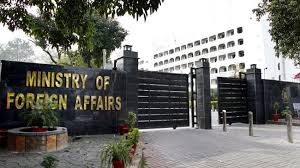Italy: MPs visit Lampedusa, primary entry point for migrants arriving by sea

Rome: A delegation of MPs from the Fratelli d’Italia party visited the Italian island of Lampedusa this week to discuss the ongoing arrival of migrant boats with Mayor Filippo Mannino.
A delegation of MPs from Italy’s ruling Fratelli d’Italia (FDI, or Brothers of Italy) party visited the island of Lampedusa on June 9. For the past 20 years, the island has been a primary European entry point for migrants arriving by sea, mostly from the coasts of Libya and Tunisia.
The delegation consisted of Arianna Meloni, the sister of Italian Prime Minister Giorgia Meloni and head of the political secretariat; the party leaders in the Chamber of Deputies and Senate, Galeazzo Bignami and Lucio Malan; department chiefs Giovanni Donzelli, Francesco Filini, and Sara Kelany; vice presidents Augusta Montaruli, Salvatore Sallemi, and Marco Scurria; and Senator Raoul Russo.
The FDI MPs visited the city hall, where they met with Mayor Filippo Mannino to discuss migrant arrivals and the hotspot on the island that has, for the past two years — since the Meloni government came to power — been managed by the Italian Red Cross.
Some 144,641 migrants have passed through the facilities in Imbriacola county since June 2023, after the Italian Red Cross took over the management of the facilities. Since Jan. 1 and until May 31 this year, a total of 18,035 migrants — a rise of 25.3 percent on the previous year, when the number was 14,393 — have arrived on Lampedusa.
In welcoming the FDI delegation, Pelagie Islands Mayor Filippo Mannino underscored that the situation on the island is still serious due to the daily arrival of hundreds of migrants, but that it had improved since the Red Cross took over the management of the hotspot.
“I became mayor and witnessed scenes unworthy of a civilised country: people crowded into the hotspots, sleeping outside, children without the chance to be seen by a paediatrician, delays in transfers, and many issues that led to my asking the government repeatedly for strong action,” Mannino said.
“Over the past two years, I have not missed what I saw when I took on this position, even though many continue to arrive — though the numbers are lower than before. We have learned to govern and handle the phenomenon. The [introduction of] presence of the Red Cross was the turning point.”
“I do not miss,” he added, “the calls I used to receive in the middle of the night when the management was in the hands of cooperatives and they had neither milk nor bottles to give to infants. This is no longer the case. The presence of the Red Cross, like the transfer of migrants within the space of 24-48 hours, since identification procedures were introduced, was the turning point.”





